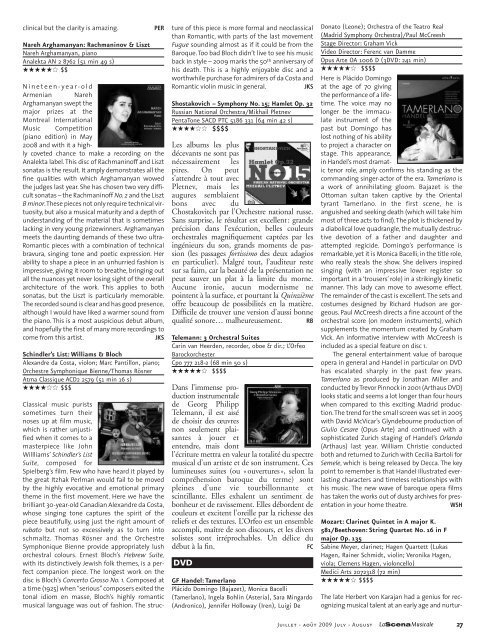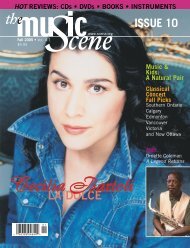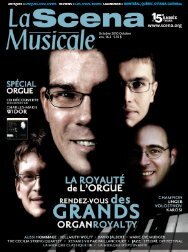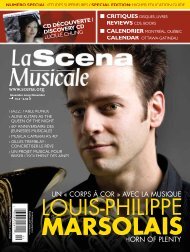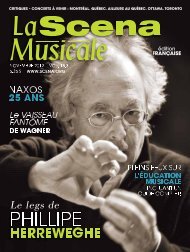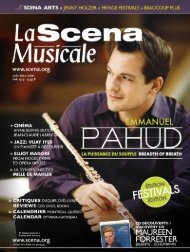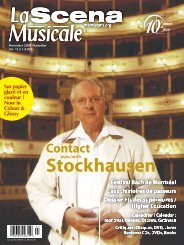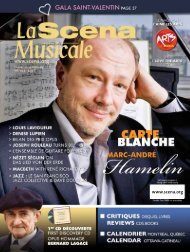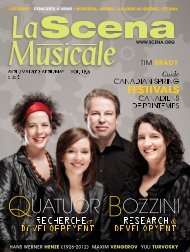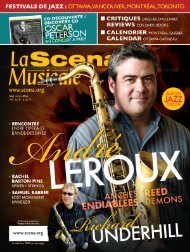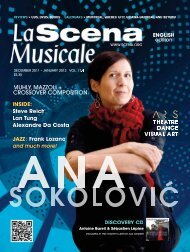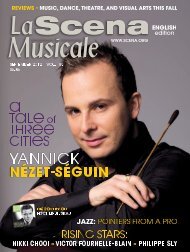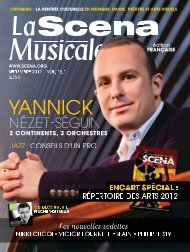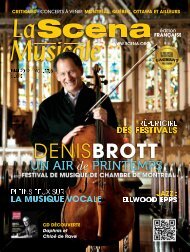Download the PDF file - La Scena Musicale
Download the PDF file - La Scena Musicale
Download the PDF file - La Scena Musicale
Create successful ePaper yourself
Turn your PDF publications into a flip-book with our unique Google optimized e-Paper software.
clinical but <strong>the</strong> clarity is amazing.<br />
Nareh Arghamanyan: Rachmaninov & Liszt<br />
Nareh Arghamanyan, piano<br />
Analekta AN 2 8762 (51 min 49 s)<br />
★★★★★✩ $$<br />
PER<br />
Nineteen-year-old<br />
Armenian Nareh<br />
Arghamanyan swept <strong>the</strong><br />
major prizes at <strong>the</strong><br />
Montreal International<br />
Music Competition<br />
(piano edition) in May<br />
2008 and with it a highly<br />
coveted chance to make a recording on <strong>the</strong><br />
Analekta label. This disc of Rachmaninoff and Liszt<br />
sonatas is <strong>the</strong> result. It amply demonstrates all <strong>the</strong><br />
fine qualities with which Arghamanyan wowed<br />
<strong>the</strong> judges last year. She has chosen two very difficult<br />
sonatas – <strong>the</strong> Rachmaninoff No. 2 and <strong>the</strong> Liszt<br />
B minor.These pieces not only require technical virtuosity,<br />
but also a musical maturity and a depth of<br />
understanding of <strong>the</strong> material that is sometimes<br />
lacking in very young prizewinners. Arghamanyan<br />
meets <strong>the</strong> daunting demands of <strong>the</strong>se two ultra-<br />
Romantic pieces with a combination of technical<br />
bravura, singing tone and poetic expression. Her<br />
ability to shape a piece in an unhurried fashion is<br />
impressive, giving it room to brea<strong>the</strong>, bringing out<br />
all <strong>the</strong> nuances yet never losing sight of <strong>the</strong> overall<br />
architecture of <strong>the</strong> work. This applies to both<br />
sonatas, but <strong>the</strong> Liszt is particularly memorable.<br />
The recorded sound is clear and has good presence,<br />
although I would have liked a warmer sound from<br />
<strong>the</strong> piano. This is a most auspicious debut album,<br />
and hopefully <strong>the</strong> first of many more recordings to<br />
come from this artist.<br />
JKS<br />
Schindler’s List: Williams & Bloch<br />
Alexandre da Costa, violon; Marc Pantillon, piano;<br />
Orchestre Symphonique Bienne/Thomas Rösner<br />
Atma Classique ACD2 2579 (51 min 16 s)<br />
★★★★✩✩ $$$<br />
Classical music purists<br />
sometimes turn <strong>the</strong>ir<br />
noses up at film music,<br />
which is ra<strong>the</strong>r unjustified<br />
when it comes to a<br />
masterpiece like John<br />
Willliams’ Schindler’s List<br />
Suite, composed for<br />
Spielberg’s film. Few who have heard it played by<br />
<strong>the</strong> great Itzhak Perlman would fail to be moved<br />
by <strong>the</strong> highly evocative and emotional primary<br />
<strong>the</strong>me in <strong>the</strong> first movement. Here we have <strong>the</strong><br />
brilliant 30-year-old Canadian Alexandre da Costa,<br />
whose singing tone captures <strong>the</strong> spirit of <strong>the</strong><br />
piece beautifully, using just <strong>the</strong> right amount of<br />
rubato but not so excessively as to turn into<br />
schmaltz. Thomas Rösner and <strong>the</strong> Orchestre<br />
Symphonique Bienne provide appropriately lush<br />
orchestral colours. Ernest Bloch’s Hebrew Suite,<br />
with its distinctively Jewish folk <strong>the</strong>mes, is a perfect<br />
companion piece. The longest work on <strong>the</strong><br />
disc is Bloch’s Concerto Grosso No. 1. Composed at<br />
a time (1925) when “serious” composers exited <strong>the</strong><br />
tonal idiom en masse, Bloch’s highly romantic<br />
musical language was out of fashion. The structure<br />
of this piece is more formal and neoclassical<br />
than Romantic, with parts of <strong>the</strong> last movement<br />
Fugue sounding almost as if it could be from <strong>the</strong><br />
Baroque. Too bad Bloch didn’t live to see his music<br />
back in style – 2009 marks <strong>the</strong> 50 th anniversary of<br />
his death. This is a highly enjoyable disc and a<br />
worthwhile purchase for admirers of da Costa and<br />
Romantic violin music in general.<br />
JKS<br />
Shostakovich – Symphony No. 15; Hamlet Op. 32<br />
Russian National Orchestra/Mikhail Pletnev<br />
PentaTone SACD PTC 5186 331 (64 min 42 s)<br />
★★★★✩✩ $$$$<br />
Les albums les plus<br />
décevants ne sont pas<br />
nécessairement les<br />
pires. On peut<br />
s’attendre à tout avec<br />
Pletnev, mais les<br />
augures semblaient<br />
bons avec du<br />
Chostakovitch par l’Orchestre national russe.<br />
Sans surprise, le résultat est excellent: grande<br />
précision dans l’exécution, belles couleurs<br />
orchestrales magnifiquement captées par les<br />
ingénieurs du son, grands moments de passion<br />
(les passages fortissimo des deux adagios<br />
en particulier). Malgré tout, l’auditeur reste<br />
sur sa faim, car la beauté de la présentation ne<br />
peut sauver un plat à la limite du morne.<br />
Aucune ironie, aucun modernisme ne<br />
pointent à la surface, et pourtant la Quinzième<br />
offre beaucoup de possibilités en la matière.<br />
Difficile de trouver une version d’aussi bonne<br />
qualité sonore… malheureusement. RB<br />
Telemann: 3 Orchestral Suites<br />
Carin van Heerden, recorder, oboe & dir.; L’Orfeo<br />
Barockorchester<br />
Cpo 777 218-2 (68 min 50 s)<br />
★★★★★✩ $$$$<br />
Dans l’immense production<br />
instrumentale<br />
de Georg Philipp<br />
Telemann, il est aisé<br />
de choisir des œuvres<br />
non seulement plaisantes<br />
à jouer et<br />
entendre, mais dont<br />
l’écriture mettra en valeur la totalité du spectre<br />
musical d’un artiste et de son instrument. Ces<br />
lumineuses suites (ou «ouvertures», selon la<br />
compréhension baroque du terme) sont<br />
pleines d’une vie tourbillonnante et<br />
scintillante. Elles exhalent un sentiment de<br />
bonheur et de ravissement. Elles débordent de<br />
couleurs et excitent l’oreille par la richesse des<br />
reliefs et des textures. L’Orfeo est un ensemble<br />
accompli, maître de son discours, et les divers<br />
solistes sont irréprochables. Un délice du<br />
début à la fin.<br />
FC<br />
DVD<br />
GF Handel: Tamerlano<br />
Plácido Domingo (Bajazet), Monica Bacelli<br />
(Tamerlano), Ingela Bohlin (Asteria), Sara Mingardo<br />
(Andronico), Jennifer Holloway (Iren), Luigi De<br />
Donato (Leone); Orchestra of <strong>the</strong> Teatro Real<br />
(Madrid Symphony Orchestra)/Paul McCreesh<br />
Stage Director: Graham Vick<br />
Video Director: Ferenc van Damme<br />
Opus Arte OA 1006 D (3DVD: 241 min)<br />
★★★★★✩ $$$$<br />
Here is Plácido Domingo<br />
at <strong>the</strong> age of 70 giving<br />
<strong>the</strong> performance of a lifetime.<br />
The voice may no<br />
longer be <strong>the</strong> immaculate<br />
instrument of <strong>the</strong><br />
past but Domingo has<br />
lost nothing of his ability<br />
to project a character on<br />
stage. This appearance,<br />
in Handel’s most dramatic<br />
tenor role, amply confirms his standing as <strong>the</strong><br />
commanding singer-actor of <strong>the</strong> era. Tamerlano is<br />
a work of annihilating gloom. Bajazet is <strong>the</strong><br />
Ottoman sultan taken captive by <strong>the</strong> Oriental<br />
tyrant Tamerlano. In <strong>the</strong> first scene, he is<br />
anguished and seeking death (which will take him<br />
most of three acts to find). The plot is thickened by<br />
a diabolical love quadrangle, <strong>the</strong> mutually destructive<br />
devotion of a fa<strong>the</strong>r and daughter and<br />
attempted regicide. Domingo’s performance is<br />
remarkable, yet it is Monica Bacelli, in <strong>the</strong> title role,<br />
who really steals <strong>the</strong> show. She delivers inspired<br />
singing (with an impressive lower register so<br />
important in a ‘trousers’ role) in a strikingly kinetic<br />
manner. This lady can move to awesome effect.<br />
The remainder of <strong>the</strong> cast is excellent.The sets and<br />
costumes designed by Richard Hudson are gorgeous.<br />
Paul McCreesh directs a fine account of <strong>the</strong><br />
orchestral score (on modern instruments), which<br />
supplements <strong>the</strong> momentum created by Graham<br />
Vick. An informative interview with McCreesh is<br />
included as a special feature on disc 1.<br />
The general entertainment value of baroque<br />
opera in general and Handel in particular on DVD<br />
has escalated sharply in <strong>the</strong> past few years.<br />
Tamerlano as produced by Jonathan Miller and<br />
conducted by Trevor Pinnock in 2001 (Arthaus DVD)<br />
looks static and seems a lot longer than four hours<br />
when compared to this exciting Madrid production.The<br />
trend for <strong>the</strong> small screen was set in 2005<br />
with David McVicar’s Glyndebourne production of<br />
Giulio Cesare (Opus Arte) and continued with a<br />
sophisticated Zurich staging of Handel’s Orlando<br />
(Arthaus) last year. William Christie conducted<br />
both and returned to Zurich with Cecilia Bartoli for<br />
Semele, which is being released by Decca. The key<br />
point to remember is that Handel illustrated everlasting<br />
characters and timeless relationships with<br />
his music. The new wave of baroque opera films<br />
has taken <strong>the</strong> works out of dusty archives for presentation<br />
in your home <strong>the</strong>atre.<br />
WSH<br />
Mozart: Clarinet Quintet in A major K.<br />
581/Beethoven: String Quartet No. 16 in F<br />
major Op. 135<br />
Sabine Meyer, clarinet; Hagen Quartett (Lukas<br />
Hagen, Rainer Schmidt, violin; Veronika Hagen,<br />
viola; Clemens Hagen, violoncello)<br />
Medici Arts 2072318 (72 min)<br />
★★★★★✩ $$$$<br />
The late Herbert von Karajan had a genius for recognizing<br />
musical talent at an early age and nurtur-<br />
Juillet - août 2009 July - August 27


